The commander of U.S. Air Force Central Command on Thursday described Wednesday's shoot-down of a U.S. surveillance drone in the Strait of Hormuz as a "dangerous and escalatory attack" by Iranian forces at a time when tensions are soaring in the Gulf region.
In a statement, Air Force Lt. Gen. Joseph Guastella said the strike on the U.S. Navy RQ-4 Global Hawk by an Iranian surface-to-air missile was an unprovoked attack, describing how the drone was "operating at high altitude, approximately 34 kilometers (about 21 miles) from the nearest point of land on the Iranian coast."
"This attack is an attempt to disrupt our ability to monitor the area following recent threats to international shipping and the free flow of commerce," he said, reading a statement to reporters at the Pentagon from Al Udeid Air Base, Qatar.
The Wednesday night downing of the RQ-4 comes days after American officials allege that Iranian forces fired a surface-to-air missile at a U.S. MQ-9 Reaper drone. That incident occurred near where officials claim Iranian forces attacked a pair of tankers near the Strait of Hormuz.
Related content:
- US Denounces 'Unprovoked Attack' After Iran Shoots Down High-Value Navy Drone
- Iran Fired Missile at US Drone Prior to Tanker Attacks: Defense Official
- Plan to Deploy 1,000 More Troops to Counter Iran Faces Growing Opposition
- Air Force Acknowledges Clandestine Base in UAE
Guastella refuted Iranian claims that the RQ-4 was flying over Iran. The drone was flying in the "vicinity of established air corridors between Dubai, UAE and Muscat, Oman," he said.
"Iranian reports that this aircraft was shot down over Iran are categorically false," Guestella continued. "The aircraft was over the Strait of Hormuz and fell into international waters."
The Global Hawk is a drone used by the Air Force and Navy that's designed to conduct intelligence, surveillance and reconnaissance missions at high altitudes.
Guastella would not take questions during the Pentagon briefing.
At a Thursday press event carried by CNN, President Donald Trump told reporters that he found it "hard to believe" that the shoot-down was intentional.
"I think Iran probably made a mistake. I think it was a general or somebody that made a mistake in shooting down that drone," he said. "It was a very foolish move, that I can tell you. ... This is a new wrinkle. This is a new fly in the ointment what happened -- shooting down that drone -- and this country will not stand for it."
Last month, the Pentagon ordered a Navy aircraft carrier strike group, amphibious ready groups and B-52 Stratofortress bombers to the gulf, citing credible threats in the region. In addition, U.S. military officials announced this week that another 1,000 troops will head to the Middle East for "defensive purposes to address air, naval and ground-based threats in the Middle East."
On Tuesday, Air Force Gen. Paul Selva, vice chairman of the Joint Chiefs of Staff, said that the Iranians most likely believe that the U.S. will not respond if attacked.
"It is a fair assessment that our history in the region is we have threatened to respond but not responded. That would be a miscalculation on the part of the Iranians to believe that that is going to persist," Selva told reporters at a Defense Writers Group Breakfast.
-- Matthew Cox can be reached at matthew.cox@military.com.













